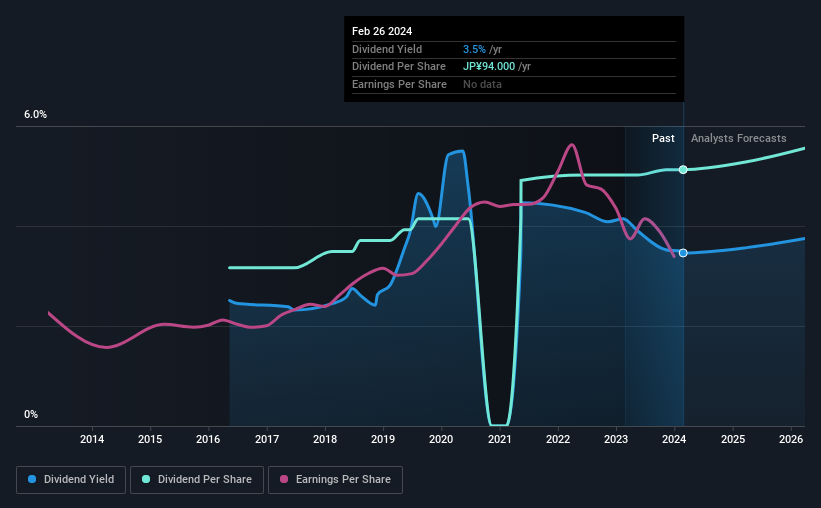Japan Post Insurance (TSE:7181) Has Announced A Dividend Of ¥47.00

Japan Post Insurance Co., Ltd. (TSE:7181) has announced that it will pay a dividend of ¥47.00 per share on the 20th of June. The payment will take the dividend yield to 3.5%, which is in line with the average for the industry.
See our latest analysis for Japan Post Insurance
Japan Post Insurance's Payment Has Solid Earnings Coverage
We like a dividend to be consistent over the long term, so checking whether it is sustainable is important. Prior to this announcement, Japan Post Insurance's earnings easily covered the dividend, but free cash flows were negative. No cash flows could definitely make returning cash to shareholders difficult, or at least mean the balance sheet will come under pressure.
Looking forward, earnings per share is forecast to rise by 8.6% over the next year. Assuming the dividend continues along recent trends, we think the payout ratio could be 42% by next year, which is in a pretty sustainable range.

Japan Post Insurance's Dividend Has Lacked Consistency
Japan Post Insurance has been paying dividends for a while, but the track record isn't stellar. This makes us cautious about the consistency of the dividend over a full economic cycle. Since 2016, the annual payment back then was ¥58.00, compared to the most recent full-year payment of ¥94.00. This means that it has been growing its distributions at 6.2% per annum over that time. We have seen cuts in the past, so while the growth looks promising we would be a little bit cautious about its track record.
Japan Post Insurance May Find It Hard To Grow The Dividend
With a relatively unstable dividend, it's even more important to evaluate if earnings per share is growing, which could point to a growing dividend in the future. However, Japan Post Insurance's EPS was effectively flat over the past five years, which could stop the company from paying more every year. Growth of 1.5% may indicate that the company has limited investment opportunity so it is returning its earnings to shareholders instead. This could mean the dividend doesn't have the growth potential we look for going into the future.
In Summary
Overall, this is probably not a great income stock, even though the dividend is being raised at the moment. With cash flows lacking, it is difficult to see how the company can sustain a dividend payment. Overall, we don't think this company has the makings of a good income stock.
Companies possessing a stable dividend policy will likely enjoy greater investor interest than those suffering from a more inconsistent approach. At the same time, there are other factors our readers should be conscious of before pouring capital into a stock. For example, we've identified 3 warning signs for Japan Post Insurance (1 is concerning!) that you should be aware of before investing. If you are a dividend investor, you might also want to look at our curated list of high yield dividend stocks.
If you're looking to trade Japan Post Insurance, open an account with the lowest-cost platform trusted by professionals, Interactive Brokers.
With clients in over 200 countries and territories, and access to 160 markets, IBKR lets you trade stocks, options, futures, forex, bonds and funds from a single integrated account.
Enjoy no hidden fees, no account minimums, and FX conversion rates as low as 0.03%, far better than what most brokers offer.
Sponsored ContentNew: Manage All Your Stock Portfolios in One Place
We've created the ultimate portfolio companion for stock investors, and it's free.
• Connect an unlimited number of Portfolios and see your total in one currency
• Be alerted to new Warning Signs or Risks via email or mobile
• Track the Fair Value of your stocks
Have feedback on this article? Concerned about the content? Get in touch with us directly. Alternatively, email editorial-team (at) simplywallst.com.
This article by Simply Wall St is general in nature. We provide commentary based on historical data and analyst forecasts only using an unbiased methodology and our articles are not intended to be financial advice. It does not constitute a recommendation to buy or sell any stock, and does not take account of your objectives, or your financial situation. We aim to bring you long-term focused analysis driven by fundamental data. Note that our analysis may not factor in the latest price-sensitive company announcements or qualitative material. Simply Wall St has no position in any stocks mentioned.
About TSE:7181
Japan Post Insurance
Provides life insurance products and services in Japan.
Fair value with acceptable track record.


